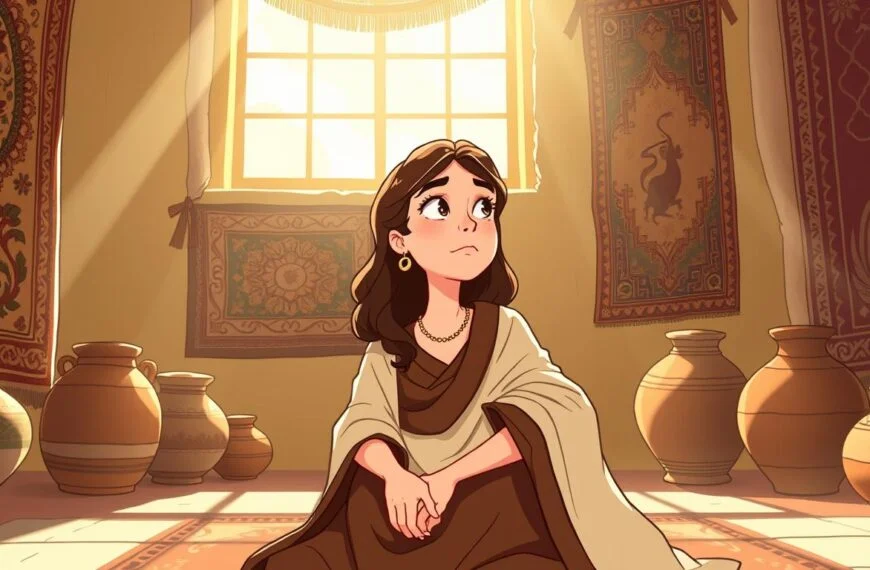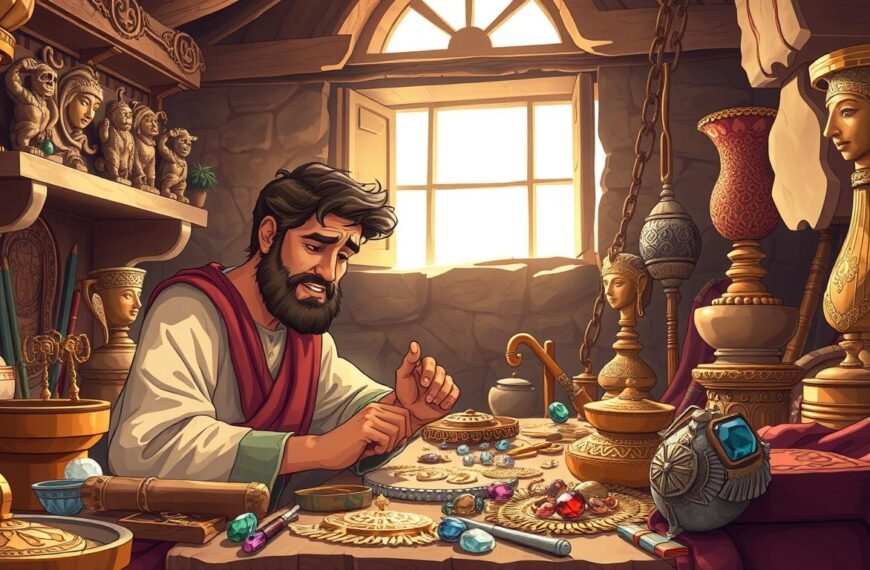What made Queen Athaliah so cruel in her quest for power? She was the only woman to rule from David’s throne. Her time in power, from 841 to 835 BC, was marked by strong men and family fights.
She was born to King Ahab and Queen Jezebel of Israel. Her rise to power was filled with family struggles and a strong faith in Baal. This led to a lot of violence in Judah.
After her son, Ahaziah, was killed, Athaliah took the throne. She had her grandsons killed to keep her power. But her cruel ways were not without challenge.
After six years, a big change came. The high priest Jehoiada led a revolt against her. This event changed Judah’s monarchy forever. The stories of Queen Athaliah are found in 2 Kings 11 and 2 Chronicles 22–23. They show her as a complex ruler and a sad figure in history.
Historical Context of Athaliah’s Reign
Athaliah’s time as queen was filled with drama and family fights. This era was marked by idol worship and battles for the throne. She was the daughter of King Ahab and Queen Jezebel, known for their bad rule.
After her son Ahaziah died, Athaliah took the throne. She had to get rid of anyone who could challenge her. This made her very powerful but also very feared.
For six years, Athaliah killed anyone who could be a threat. This showed her strong will but also made many people angry. Her grandson, Joash, would later challenge her rule.
Athaliah wanted to make Baal worship more popular. This was different from the usual worship in Judah. Her efforts showed the struggle between different beliefs during her time.
Her story is complex, showing what it was like for a woman to be in charge. Athaliah’s reign is still talked about and debated today.
Family Background and Parentage of Athaliah
Athaliah’s family background is key to understanding her reign. She was born around 893 B.C. in Samaria. Her parents were King Ahab and Queen Jezebel, famous in Israel’s history.
Her family ties her to the House of Ahab. This makes her part of a story filled with power and conflict. Ahab and Jezebel were known for their idolatry, which influenced Athaliah’s goals as queen.
Growing up, Athaliah was shaped by her parents’ values. The Bible doesn’t say her beliefs, but Jezebel’s influence is clear. Her family’s legacy guided her actions and beliefs as Judah’s ruler from 842 B.C. to 837 B.C.
Athaliah’s reign was marked by ambition and idolatry. It was a continuation of her family’s legacy.
Who Is Athaliah In The Bible?
Athaliah was a queen in Judah after her son Ahaziah died. She was very powerful and made big changes. She wanted to keep her power and control over Judah.
Overview of Athaliah’s Role in Judah’s Monarchy
Athaliah ruled Judah for about six years. She changed how the country was run. She even took down parts of the temple of Yahweh to build one for Baal.
People saw her as bad because she killed her own family. This made her known as a usurper.
Connection to the House of Ahab
Athaliah was related to the House of Ahab. This made her very powerful. She married Jehoram of Judah, making their families close.
This connection changed Judah’s beliefs and politics. It made things more complicated for the country.
Athaliah’s Marriage and Influence
Athaliah married Jehoram of Judah, which helped her become powerful. This marriage linked her to the Davidic line. It also made a strong alliance between the southern and northern kingdoms.
During Jehoram’s rule, Athaliah had a big say. Her beliefs in idolatry were like those of Ahab and Jezebel. This was because she grew up in their court.
Marriage to Jehoram of Judah
Athaliah’s marriage to Jehoram was a big deal for Judah. It connected the two royal houses. It also brought Baal worship to Judah.
This marriage was not just about family. It was a political move to gain power. As queen, Athaliah became a key figure in Jehoram’s rule. She challenged old ideas of royal power.
Impact on Jehoram’s Reign
Athaliah’s influence on Jehoram’s rule was huge. His time as king was marked by idolatry and moral fall. This was mainly because of her advice.
Her views on worship and governance led to Judah turning away from Yahweh. Many followed the Baal cult. Yet, her political skills helped guide Jehoram. This shows how a queen can change history in Judah.

Ascension to Power After Ahaziah
Athaliah became queen after her son, Ahaziah, died. She took the throne by force. This move led to a bloody end for her family.
Events Leading to the Usurpation of the Throne
Ahaziah’s death made Athaliah very powerful. She saw her grandsons as threats. So, she quickly took control of Judah, ruling with fear.
The Massacre of Royal Family Members
Athaliah killed her grandsons to keep her power. But she spared one, Joash, thanks to his aunt, Jehosheba. This act made her a ruler known for her cruelty.
The Reign of Queen Athaliah
Queen Athaliah ruled Judah for six years. Her rule was marked by tyranny. She took power by killing her own family.
She made people worship idols, especially Baal. But, not many religious leaders supported her. Athaliah was feared and brutal, always looking to get rid of threats.
Feminist scholars see Athaliah’s rise as a challenge to men’s power. They look at how religion and politics mixed to help her. They wonder if her actions were just for power or true faith.
Queen Athaliah’s story warns us about the dangers of too much ambition. Her tale is a key part of history, showing the dark side of leadership and the price of tyranny.
Athaliah and Baal Worship
Athaliah changed Judah’s religion by promoting Baal worship. This lasted from 842 to 836 B.C.E. After her son Ahaziah was killed by Jehu, Athaliah took power. She killed her own family members to keep her power.
Her actions showed her strong loyalty to Baal. This was because of her mother, Jezebel, who brought these practices to Israel.
Influence of Baal Practices in Judah
Baal worship became big in Jerusalem under Athaliah. She put Baal priests in place and built altars for this god. This was different from worshiping Yahweh.
Her support for Baal worship changed the religious order. It let idolatry grow, showing her connection to Jezebel. In particular, Athaliah’s focus on Baal worship helped her keep her power.
Comparison to Queen Jezebel
Athaliah was like Jezebel in many ways. Both queens pushed for worship of foreign gods, not Yahweh. They both changed their kingdoms a lot.
Jezebel was known for her tough tactics. Athaliah used violence too. Their stories show how two women used idolatry to shape their kingdoms.
The Downfall of Athaliah
Athaliah’s downfall was a big change for Judah. She ruled for six years and was very mean. High Priest Jehoiada and his friends worked together to stop her.
They wanted to bring back the Davidic line. Athaliah had killed all the possible heirs, even her own grandkids.
High Priest Jehoiada’s Role
Jehoiada was key in the fight against Athaliah. He knew she was bad and followed false gods. So, he secretly gathered people who wanted the true Davidic line.
He hid Joash, the only one left alive. Joash was the last hope to be the king.
Coronation of Joash and the Revolt
Joash’s secret coronation was a sign of hope. When people cheered for him, Athaliah got scared. She shouted “Treason! Treason!”
Her power was over. The revolt ended with her caught and killed. This brought back the Davidic line and peace to Judah.

Athaliah in Historical and Literary Context
Athaliah’s story is found in history and literature. It shows a complex view of her rule. Her parents, Ahab and Jezebel, were known for trouble and idolatry.
This background helps us understand her actions. Josephus wrote about her plans and violence. He made her a key figure in ancient Israel’s history.
Athaliah in Josephus’ Writings
Josephus wrote a lot about Athaliah. He said she was ambitious and cruel. He talked about her trying to get rid of the Davidic family.
His stories match the Bible, making her seem very bad. Josephus showed how she got power. He made her a strong queen and a tragic figure.
Athaliah as a Subject in Literature
Many writers have talked about Athaliah over the years. Jean Racine wrote “Athalie,” showing her as complex. He showed her struggle between power and right and wrong.
Her story makes us feel for her, even though she was bad. Writers see her as a symbol of evil and a sign of good coming back. Her story shows the power and legacy of her life.
The Legacy of Queen Athaliah
Athaliah’s story is complex and full of lessons. She was the only queen to rule in Israel and Judah on her own. Her actions changed the religious scene of her time.
She hid Joash, the true heir, to keep her power. Her rule was marked by ambition and tyranny. This shows how power can weigh heavily in a society ruled by men.
She followed Baal worship, which led to her downfall. A revolt led by Jehoiada ended her rule. This revolt brought back Joash, who was just seven years old.
It also changed Judah’s beliefs and direction. Jehoiada made a pact with the people. This pact led to the destruction of Baal temples and idols. Athaliah’s story warns against the dangers of ambition and moral decay.
Her legacy teaches us about the dangers of power and idolatry. It also talks about women’s roles in leadership. Athaliah’s story has lasted through the ages, teaching us important lessons.
Interpretation and Theological Reflections
The rule of Athaliah is a deep topic for thought. It shows how a woman in power can lead to trouble. After her son Ahaziah died, she took over for about six years. Her rule was marked by cruelty.
People often talk about how she killed off the royal family in Judah. This shows she was a bad leader. It caused a lot of problems for the nation.
Critique of Athaliah’s Rule
Athaliah is seen as very bad in the Bible. Her actions were opposite of what God wants for leaders. This is shown in God’s promise to David in 2 Samuel 7:16.
Her story is not just about her bad character. It shows how power and being good can clash. Her family was known for being evil, which makes her story even more complex.
Feminine Power in Biblical Narratives
Athaliah’s story makes us think about women in power in the Bible. Even though she had a lot of power, her rule is seen as bad. This makes us wonder about women’s roles in the Bible.
Her story is compared to the idea of God’s rule in the Bible. This shows how hard it is to understand gender and power in the Bible. When Joash, the rightful king, took back his throne, it showed God’s plan won over human plans. This balance is key in understanding the Bible’s views on gender and power.
Looking into these ideas helps us understand gender in faith and history better. For more, check out this academic view.
The Symbolism of Athaliah’s Name
The name Athaliah has deep symbolism in the Bible. It means “God is exalted” or “dealt violently with by God.” This shows two sides of her life. Her rule was filled with trouble for Judah.
Instead of being honored, Athaliah’s actions led to her downfall. She killed her own family to keep power. This shows a big question about God’s justice.
Her story is unique because she was the only woman to rule David’s throne. Her rule lasted six years, starting around 846 B.C. She killed her family to stay in power. This makes us think about power and morality in leadership.
Her name teaches us about the balance between power and doing right. Athaliah’s story is known in many cultures. It shows her complex and spiritual meaning.
Lessons from Athaliah’s Story
Athaliah’s story teaches us about the dangers of too much ambition. Her actions show how bad choices can harm many. She came from a family known for evil, which influenced her own path.
She wanted everyone to worship Baal, which made Judah’s faith weak. This shows how wrong leadership can hurt a community’s spirit.
She also killed her own grandsons to keep power. This shows the terrible things people do for control. When she was gone, people were happy, showing the need for good leaders.
Athaliah’s tale warns us against following evil. It tells us to choose right over wrong. These lessons are still important today, reminding us to lead with integrity.
FAQ
Who was Athaliah in the Bible?
Athaliah was a queen who ruled Judah from about 841–835 BC. She was Ahab and Jezebel’s daughter. She loved Baal and was very ambitious.
What is the historical context of Athaliah’s reign?
Athaliah ruled during a time of trouble. There was a lot of politics and family fights. She also pushed for Baal worship.
What was Athaliah’s family background and parentage?
Athaliah was born to King Ahab and Queen Jezebel. This made her part of the House of Ahab. It shaped who she was as a queen.
What was Athaliah’s role in Judah’s monarchy?
Athaliah became queen after her son Ahaziah died. She wanted to keep her power. Her actions were different from the usual rulers of Judah.
How did Athaliah’s marriage to Jehoram influence Judah?
Athaliah married Jehoram, King of Judah. This made her part of the Davidic line. She used her power to push for idol worship.
What events led to Athaliah’s usurpation of the throne?
After Ahaziah died, Athaliah killed her grandsons. This made her the only one left to rule. She took control of Judah by force.
What characterized the reign of Queen Athaliah?
Athaliah was very cruel and made everyone worship Baal. She was always scared and used force to keep control. This made her people very afraid.
How did Athaliah influence Baal worship in Judah?
Athaliah pushed for Baal worship a lot. She put Baal priests in charge and built altars. This made Baal worship strong in Judah.
What led to Athaliah’s downfall?
High Priest Jehoiada and others worked together to take her down. They crowned Joash, the last heir, in secret. This started a fight against her.
What is the significance of Athaliah in historical and literary contexts?
Athaliah is known from the Bible and other historical writings. Josephus talked about her. She’s also in Jean Racine’s play “Athalie,” showing her complex side.
What is the legacy of Queen Athaliah?
Athaliah is remembered for her fear and her interesting story. She shows the dangers of being too ambitious and cruel.
How is Athaliah’s rule critiqued in theological discourse?
People see Athaliah as a bad leader who made Judah worse. Her story contrasts with the good female leaders in the Bible. It makes us think about power and gender.
What does the name ‘Athaliah’ symbolize?
Athaliah means “God is exalted” or “dealt violently with by God.” But her life went in a bad direction, despite her name.
What lessons can be drawn from Athaliah’s story?
Athaliah’s story teaches us about the dangers of being too ambitious and worshiping idols. It reminds us to be moral leaders.

Rockin’ the faith, one verse at a time!
Growing up, the Bible’s stories deeply impacted me. Now, with over 15 years of preaching experience, I blend timeless teachings with modern technology, making them relevant for today’s world.
Bible Hub Verse is my platform to share historical insights and thought-provoking articles, exploring both familiar and uncommon Christian topics. My passion is building a welcoming online space for everyone to learn, grow in their faith, and discover the Bible’s enduring message.
Join the journey!
God bless you.









